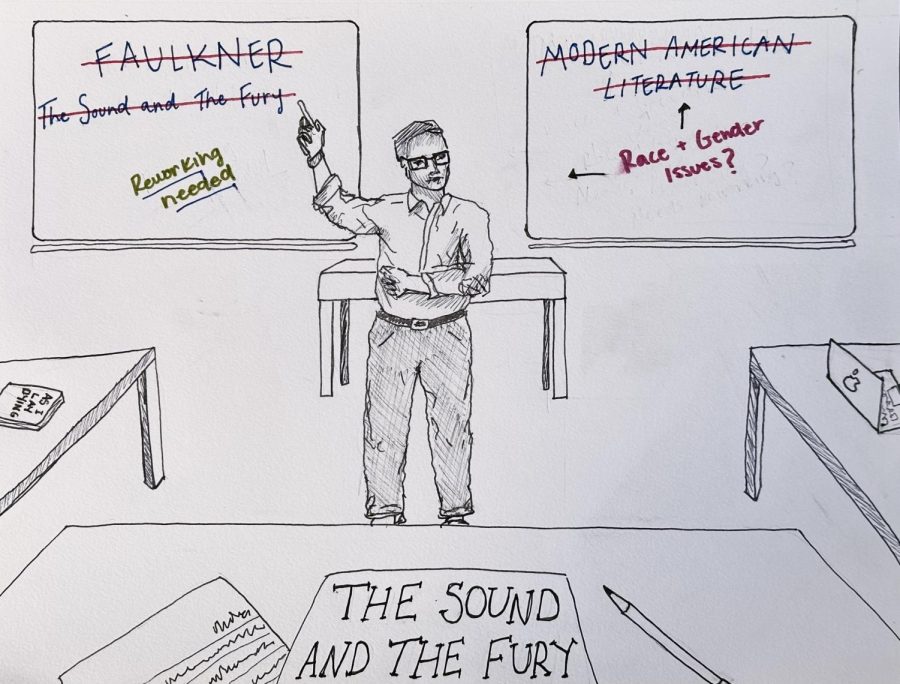Where did “Modern American Lit” and “Faulkner” go?
Modern American Literature (MAL) and Faulkner, two English classes that Urban has offered since the ‘90s, are being temporarily removed from the curriculum.
Many factors that contributed to the English department’s decision to rethink MAL, but most importantly, how it affected students. English Teacher Ben Slater said, “On a deeper level, we were all already talking about and maybe living through something traumatic last year with COVID, lockdowns, racism, threats to democracy and the climate crisis.” He said, “When this course was talking about trauma 10 years ago, that wasn’t so much in student’s vocabulary.”
In the fall of 2022, Modern American Literature (MAL) started and then removed “The Brief and Wondrous Life of Oscar Wao” in response to students expressing discomfort with the material.
In 2018, Junot Díaz published a personal essay highlighting his childhood trauma, masculinity and sexism, and how these topics show up in his work. Following the publication, two women spoke out about the misogyny and discomfort they experienced at the hand of Díaz. Amidst this, an MAL class was in session. As an aid to deconstruct Díaz’s work, the class read his personal essay to provide a more complete understanding of his voice and his intention with “The Brief and Wondrous Life of Oscar Wao.” The next academic year that MAL was offered, students read his essay prior to reading the novel, which led to some hesitancy about reading Díaz’s work. Subsequently, “There There” by Tommy Orange replaced Díaz’s book for that term.
While many students found it insensitive to read Díaz’s work, Nora Onek ‘23, a student in MAL in the fall of 2021, said, “I think the conversation was just, ‘We can’t read this book, look at how it talks about women, this is so messed up,’ when in reality, it’s important for us to read things like that.” Onek emphasized that this book is told from a specific perspective that is underrepresented in literature. “My class also talked about him being a Dominican man and that culture is something that not a lot of books are written about,” Onek said.
Aside from the student concern that urged this novel’s omittance from MAL, it is not uncommon for a class at Urban to evolve and adjust over time. Slater, who has taught MAL and also took the course as a student, said, “All the texts have changed in Modern American Literature.” MAL specifically has shifted as the department makes an effort to center new themes in the curriculum.
The decision to no longer offer Faulkner also stemmed from student concern, as the course has been challenged by students for the past few years. Apart from William Faulkner’s use of outdated racial viewpoints in his writing, some students took issue with how the class itself engaged with that content.
Alex Thaler ‘23, a student who took Faulkner in the winter of last year, said, “I think the worst part was [that] the assignments [were] not really sensitive to [these complex concepts].” For one of the free writes, students were asked to explore the perspective of a character who is described as a man-child and who students presume to be autistic. The assignment asked students to channel that character in their writing. Thaler said, “It was definitely a very strange assignment and it didn’t feel right to do.”
With the potential removal of Faulkner and the reworking of MAL, Cathleen Sheehan, chair of the English department, provided insight into how English classes are typically adjusted. It begins with teachers and students reflecting on the environment created in the classroom. “[We ask], ‘are we teaching the way we want to teach?’” Sheehan said. “I don’t want to lose the positive feedback that we’ve got either, so it is always kind of navigating this mixed bag, even when there’s sort of a theme of discomfort or some pushback. We don’t want to lose what’s good either.”

